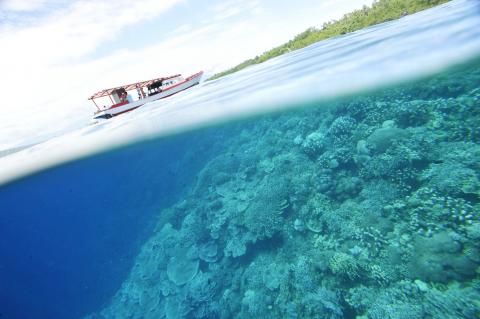More than 2,600 of the world’s top marine scientists yesterday warned coral reefs around the world were in rapid decline and urged immediate global action on climate change to save what remains.
The consensus statement at the International Coral Reef Symposium, being held in the northeastern Australian city of Cairns, stressed that the livelihoods of millions of people were at risk.
Coral reefs provide food and work for countless coastal inhabitants globally, generate significant revenues through tourism and function as a natural breakwater for waves and storms, they said.

Photo: AFP
The statement, endorsed by the forum attendees and other marine scientists, called for measures to head off escalating damage caused by rising sea temperatures, ocean acidification, overfishing and -pollution from the land.
“There is a window of opportunity for the world to act on climate change, but it is closing rapidly,” said Terry Hughes, convener of the symposium, held every four years, which attracted about 2,000 scientists from 80 countries.
Jeremy Jackson, senior scientist at the Smithsonian Institution in the US, said reefs around the world have seen severe declines in coral cover over the past several decades.
In the Caribbean, for example, between 75 and 85 percent of the coral cover has been lost in the past 35 years.
Even the Great Barrier Reef in Australia, the best-protected reef ecosystem on the planet, has witnessed a 50 percent decline in the last 50 years.
Jackson said that while climate change was exacerbating the problem, it was also causing increased droughts, agricultural failure and sea level rises at increasingly faster rates, which implied huge problems for society.
“That means what’s good for reefs is also critically important for people and we should wake up to that fact,” he said. “The future of coral reefs isn’t a marine version of tree-hugging, but a central problem for humanity.”
Stephen Palumbi, director of Stanford University’s Hopkins Marine Station, said addressing local threats, such as poor land -development and unsustainable fishing practices, was also critical.
More than 85 percent of reefs in Asia’s “Coral Triangle” are directly threatened by human activities such as coastal development, pollution and overfishing, according to a report launched at the forum earlier yesterday.
The Coral Triangle covers Indonesia, Malaysia, Papua New Guinea, Philippines, the Solomon Islands and East Timor and contains nearly 30 percent of the world’s reefs and more than 3,000 species of fish.
International Society for Reef Studies president Robert Richmond said that the consensus statement was not just another effort at documenting the mounting problems.
Instead, he said it was also about making the best available science available to leaders worldwide.
“The scientific community has an enormous amount of research showing we have a problem, but right now, we are like doctors diagnosing a patient’s disease, but not prescribing any effective cures,” he said. “We have to start more actively engaging the process and supporting public officials with real-world prescriptions for success.”

In the sweltering streets of Jakarta, buskers carry towering, hollow puppets and pass around a bucket for donations. Now, they fear becoming outlaws. City authorities said they would crack down on use of the sacred ondel-ondel puppets, which can stand as tall as a truck, and they are drafting legislation to remove what they view as a street nuisance. Performances featuring the puppets — originally used by Jakarta’s Betawi people to ward off evil spirits — would be allowed only at set events. The ban could leave many ondel-ondel buskers in Jakarta jobless. “I am confused and anxious. I fear getting raided or even

Eleven people, including a former minister, were arrested in Serbia on Friday over a train station disaster in which 16 people died. The concrete canopy of the newly renovated station in the northern city of Novi Sad collapsed on Nov. 1, 2024 in a disaster widely blamed on corruption and poor oversight. It sparked a wave of student-led protests and led to the resignation of then-Serbian prime minister Milos Vucevic and the fall of his government. The public prosecutor’s office in Novi Sad opened an investigation into the accident and deaths. In February, the public prosecutor’s office for organized crime opened another probe into

RISING RACISM: A Japanese group called on China to assure safety in the country, while the Chinese embassy in Tokyo urged action against a ‘surge in xenophobia’ A Japanese woman living in China was attacked and injured by a man in a subway station in Suzhou, China, Japanese media said, hours after two Chinese men were seriously injured in violence in Tokyo. The attacks on Thursday raised concern about xenophobic sentiment in China and Japan that have been blamed for assaults in both countries. It was the third attack involving Japanese living in China since last year. In the two previous cases in China, Chinese authorities have insisted they were isolated incidents. Japanese broadcaster NHK did not identify the woman injured in Suzhou by name, but, citing the Japanese

RESTRUCTURE: Myanmar’s military has ended emergency rule and announced plans for elections in December, but critics said the move aims to entrench junta control Myanmar’s military government announced on Thursday that it was ending the state of emergency declared after it seized power in 2021 and would restructure administrative bodies to prepare for the new election at the end of the year. However, the polls planned for an unspecified date in December face serious obstacles, including a civil war raging over most of the country and pledges by opponents of the military rule to derail the election because they believe it can be neither free nor fair. Under the restructuring, Myanmar’s junta chief Min Aung Hlaing is giving up two posts, but would stay at the